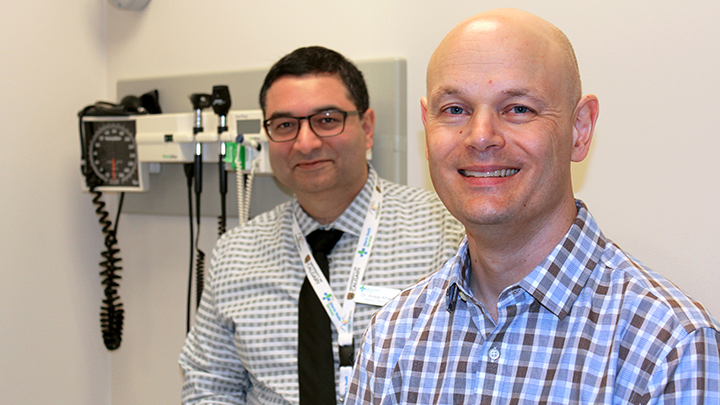
February 17, 2017

Darren Bidulka, right, is the first patient with Fabry disease in the world to undergo gene therapy. Here he’s shown with medical geneticist Dr. Aneal Khan at Foothills Medical Centre in Calgary.
Story & Photo by Greg Harris
CALGARY — For more than 10 years, Calgary resident Darren Bidulka has had to set aside two hours every two weeks for enzyme replacement therapy, which helps his body offset the effects of a rare inherited genetic disorder he has called Fabry disease.
Without the treatment, there is a risk his heart, brain or kidneys could be damaged; people with Fabry disease are also at risk for a shortened lifespan.
“It’s somewhat disruptive having to arrange your life around a biweekly infusion schedule, but compared to many people with Fabry disease, I’ve been fortunate,” says the 48-year-old. “There are day-to-day challenges but, other than that, my quality of life is very good.”
Now, thanks to a team of physicians and researchers at Foothills Medical Centre in Calgary, Darren is the first patient in the world to undergo gene therapy for Fabry disease.
People with Fabry disease have a gene called GLA that doesn’t function as it should; as a result their bodies are unable to make the correct version of a particular enzyme that breaks down a fat called Gb3. It’s the buildup of Gb3 that can lead to problems with the major organs.
In the trial, researchers collected a quantity of Darren’s blood stem cells, then used a specially engineered virus to augment those cells with copies of the fully functional gene that is responsible for the enzyme. Darren received the altered stem cells back on Jan. 11, 2017.
“It’s too soon to say whether this therapy will ultimately be a long-term treatment for Fabry disease but, based on the success of animal trials, we are hopeful there will be a benefit to patients,” says Dr. Aneal Khan, the Alberta Health Services medical geneticist and member of the Alberta Children’s Hospital Research Institute, Cumming School of Medicine, University of Calgary, who is leading the experimental trial in Calgary.
Dr. Jeffrey Medin, a researcher with the Medical College of Wisconsin and the project’s principal investigator, says it will be months before the researchers are able to measure whether they’ve made an impact.
“This experimental trial nevertheless marks a major step forward in treating inherited genetic diseases in adults,” says Dr. Medin. “It is very promising that we were able to engineer the complex logistics of such a trial and that the procedure itself seems to have been well-tolerated.”
The treatment, which has been approved by Health Canada for experimental purposes, is also believed to be the first trial in Canada to use a lentivirus in gene therapy. In this case, the specially modified virus was stripped of its disease-causing capability and augmented with a working copy of the gene that’s responsible for the missing enzyme.
“We’ve proven this works in mice but, of course, successful animal trials don’t always mean successful human trials,” says Dr. Medin, who has been working on the project for more than 20 years since he was at the National Institutes of Health in Bethesda, Md.
Adds Dr. Khan: “Even some improvement in enzyme levels could brighten the long-term outlook for these patients and lead to a better quality of life.”
About 420 Canadians have Fabry disease.
Aside from the risks to major organs, many people with Fabry disease can also have a decreased ability to perspire, skin rashes, chronic pain and gastrointestinal difficulties.
“A long-term treatment for Fabry disease would be fantastic, but I don’t want to create any false hopes for myself or others at this preliminary stage,” Bidulka says. “If my involvement in the research helps shed more light on the disease and brings doctors closer to an ultimate cure, then it will have been worth it.”
Although several gene therapies have been used in Canada for cancer, this study is believed to be the first in the country to test a gene therapy for an inherited metabolic disorder.
The project is being funded by the Canadian Institutes of Health Research and the Kidney Foundation of Canada. The Queen Elizabeth II Health Sciences Centre in Halifax and the University Health Network in Toronto are also recruiting people with Fabry disease for the trial.